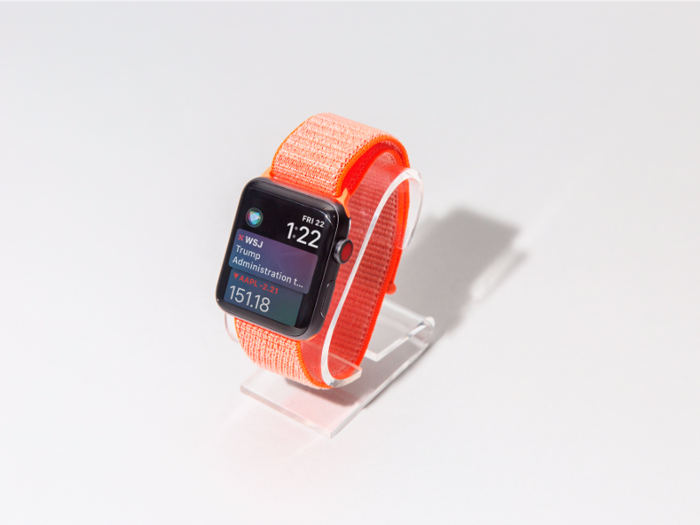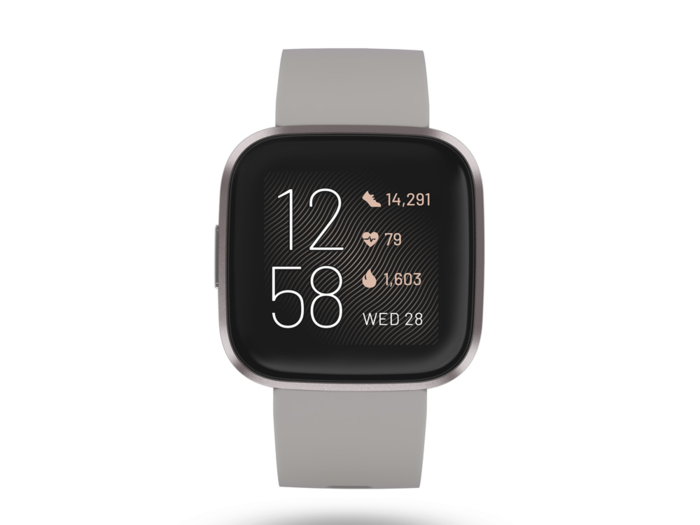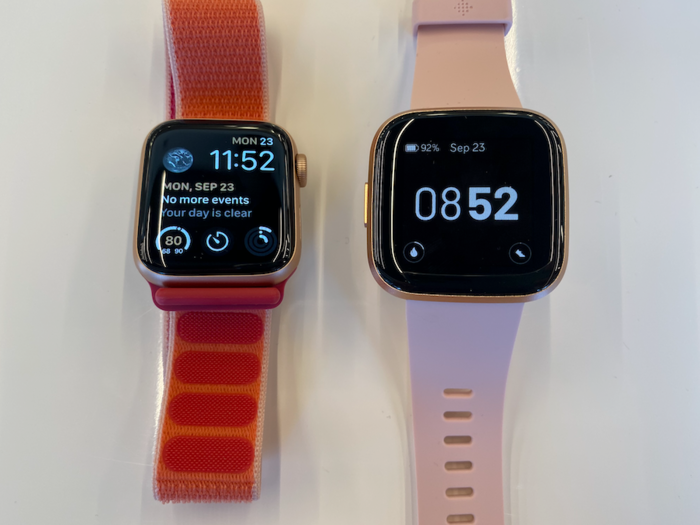- Home
- slideshows
- miscellaneous
- I'm a loyal Apple Watch user, but after switching to Fitbit, I found 3 things I liked better and 3 things I didn't
I'm a loyal Apple Watch user, but after switching to Fitbit, I found 3 things I liked better and 3 things I didn't
The Fitbit Versa 2's battery life is excellent compared to the Apple Watch's.

And the Versa can track sleep natively, which means you don't have to download an app to do so.

That long battery life can come in handy if you're hoping to track your sleep using the Fitbit Versa 2.
Fitbit's smartwatch, unlike the Apple Watch, can natively monitor your sleep, meaning it's able to provide statistics such as how much time you spend asleep and a breakdown of how much of your slumber was spent in light, deep, or REM sleep. It also issues you a Sleep Score based on metrics such as sleep duration and sleep quality.
The Apple Watch doesn't currently offer sleep tracking by default; instead, you must download a third-party app. Apple is reportedly testing sleep tracking for future Apple Watch iterations, however, according to Bloomberg.
But the Apple Watch's higher price tag means it comes with a handful of health and fitness-oriented features not found on Fitbit's Watch. Fitbit does support more types of workouts, however.

Both the Apple Watch Series 5 and Fitbit Versa 2 can deliver metrics such as step tracking, distance walked or run, calories burned, and minutes spent active. They can also track a range of different workout types, including elliptical workouts, cycling or spinning, and swimming in addition to basics like walking, running, and weight lifting.
Both watches will also ping you hourly to remind you to move, although the ways in which they do so differs. (Apple prompts you to stand, while Fitbit reminds you to meet an hourly step goal.)
But Fitbit offers more variety when it comes to supported exercises; it can also track more specialized workouts and sports such as kickboxing, pilates, golf, circuit training, and martial arts unlike the Apple Watch.
Still, the more expensive Apple Watch comes with additional health and fitness-oriented features and hardware not found on Fitbit's smartwatch. It can, for example, track wheelchair workouts and can notify you if you're being exposed to high sound levels for prolonged periods of time to protect your hearing health.
The Apple Watch Series 5 also has an electrical heart rate sensor for taking electrocardiogram readings, a built-in GPS sensor for location tracking, and a compass for providing more precise directions. It can also help connect you to emergency services if it's detected that you've taken a hard fall, unlike Fitbit's Versa 2.
The Apple Watch is generally better at functioning as a smartwatch.

While Fitbit offers many of the basic functions of a smartwatch, such as a built-in voice assistant (Amazon's Alexa) and the ability to deliver notifications to your wrist, the Apple Watch has a much larger App Store and more polished software.
Take a look at the Apple Watch's always-on display functionality as evidence of this. All of Apple's watch faces are optimized to work in always-on display mode, making it possible to see information like your next calendar event or the weather even when the display isn't activated.
Fitbit's Versa 2, on the other hand, has a standard clock face for its always-on display that isn't as customizable as Apple's.
Those who choose the Apple Watch also have a significantly larger pool of apps to choose from. There are nearly 20,000 apps designed for the Apple Watch, whereas Fitbit's App Gallery only has hundreds of apps.
The Apple Watch also has a very handy feature for iPhone owners that often misplace their devices. You can swipe up from the bottom of the display and tap a button in the Apple Watch's Control Center to send a ping to your phone — a feature I use constantly when my phone sinks between the couch cushions or becomes buried at the bottom of my bag.
But Fitbit doesn't require you to commit to the iPhone or Android.

While the Apple Watch requires an iPhone, Fitbit devices work nearly the same on both Android and iOS. The exception is that you're unable to reply to text messages on your wrist if you're using your Fitbit with an iPhone.
That flexibility could make Fitbit a more compelling option for those who are considering switching between Android and the iPhone when it comes to their smartphone of choice.
So which one is right for you?

If you're looking for a relatively inexpensive wearable that nails the basics when it comes to serving as a smartwatch and a fitness tracker, the $200 Fitbit Versa 2 is an ideal choice. It'll last for multiple days on a single charge, so you won't have to worry about bringing your charger during a weekend trip, and it can track metrics like distance run and calories burned while delivering call, text, and app notifications to your wrist. Plus, the Versa 2 can track your sleep natively, unlike the Apple Watch.
But the $400 Apple Watch Series 5 also offers many perks of its own that you won't find on Fitbit's less expensive Versa 2. Features like a built-in GPS, a compass, a heart rate sensor capable of taking an electrocardiogram, the ability to detect hard falls, and international emergency calling could make the Apple Watch Series 5 a better choice for frequent travelers or those who need to keep closer watch over their heart rate. Not to mention, Apple's App Store offers much more variety than Fitbit's, and its software is generally more polished.
Apple loyalists that care about the above features and want some consistency between the software experience on their smartwatch and smartphone should opt for the Series 5, or the less expensive $200 Series 3. But shoppers that primarily want a smartwatch for basic fitness tracking and notifications that don't want to be locked into Apple's ecosystem will be more pleased with the Versa 2.
Popular Right Now
Popular Keywords
Advertisement